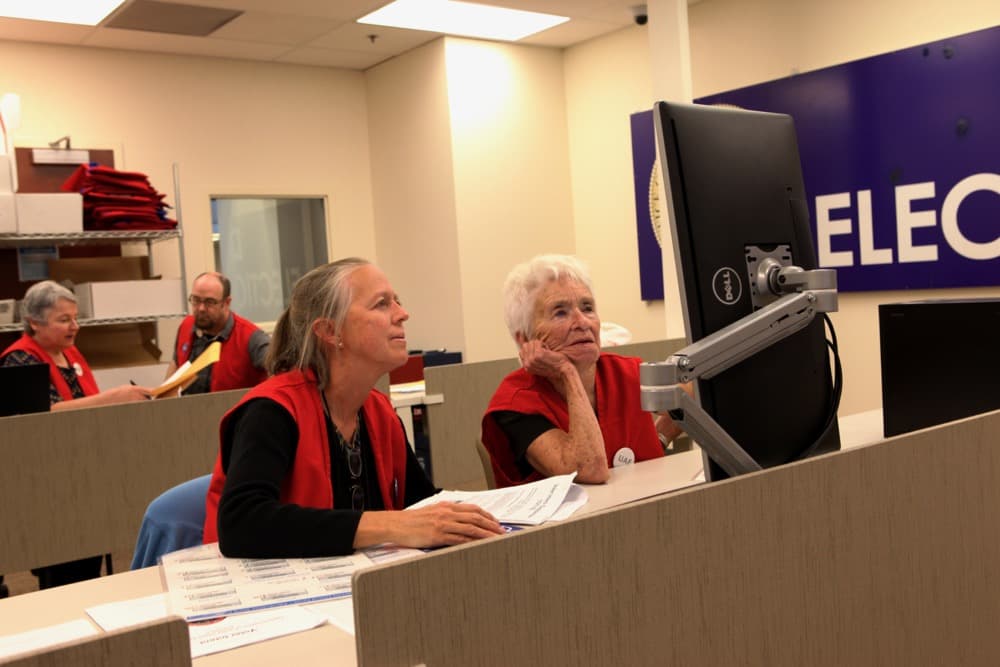Rumors and fake news have made a habit of traveling very fast in this election. Let's talk about what can go wrong, and where you can find reliable election results for our local, state and presidential races. We'll be drawing from On The Media's breaking-news consumer's handbook as well as our staff's own experience in newsrooms around the country.
Watch the elections results yourself.
You're going to see people on both sides claiming victory way, way too early. My advice: Ignore the exit polls and wait for the results.
You can watch Denver's ballots come in here. State results will be available here. I'd expect them to be posted shortly after 7 p.m.
For a national dashboard, you might look to The New York Times. Whatever you may think of it, the Times is making its Election Day coverage free, and tends to have some very reliable and readable live results.
FiveThirtyEight also has an hour-by-hour guide to watching the elections. Colorado results should start to come in around 7 p.m.
Wait for confirming witnesses and video on breaking news.
A thousand retweets does not make a single person's claims true. We have seen many, many false claims go viral including false reports of an"assassination attempt" against Trump on Saturday.
People are trying to be first to the punch, and it seems like the strongest claims get the strongest response -- even if it's not true. Moreover, individual witnesses' accounts can vary drastically. The solution to this is you, in part, especially when it comes to reports of violence.
Is retweeting that unsubstantiated claim going to add anything to the conversation, or is it going to needlessly contribute to a general sense of unease and panic?
Even more maddening: If there actually is a major, violent news event, you can expect that the initial media reports will be wrong in some way. The best you can do is wait for reports from multiple outlets, and place your emphasis on those with multiple named sources.
If you have never seen a news source before, then you need to ask yourself whether it's legitimate. For example, the Denver Guardian materialized recently with a baloney story about a politics-related murder. The best ways to do this can include looking for other sources on the story and looking through the rest of the site for telltale clues, such as false contact information or a lack of contact information.
Do report voting issues.
We might also expect to see claims of tricky voting machines, fraud and suppression. It happens every cycle. Be wary of these claims -- but do not hesitate to report what you're seeing yourself.
If you believe someone is attempting to intimidate you or unduly influence your vote, I would suggest calling the Department of Justice: 800-253-3931. You can also try the nonpartisan Election Protection Coalition at 866-687-8683.
ProPublica's Electionland also is monitoring problems of voter access.
Listen for the language.
Lastly, it helps to know how to "read" reporting. On The Media offers this handy guide to the language of the news:
- "We are receiving reports." Anonymous sources are saying something has happened, but it isn't confirmed.
- "We are seeking confirmation." Getting warmer, but it's still not verified.
- "We can confirm." Multiple sources confirming. This is looking pretty solid.
- "We have learned." The outlet thinks it has a scoop. This might mean that they're out on a limb or that they are the first to confirm, according to Andy Carvin, an expert in social-media news gathering.
When in doubt, look for multiple reports, read them all and compare.
More on the problem:
On Saturday night, a speaker introducing Donald Trump at the Denver Coliseum mentioned that there had been an "attempt of murder" against Trump at his Reno, Nev. event a few hours earlier.
There had not been – unless you're really worried about a guy with an unfavorable sign. Hearing it mentioned as fact at a political rally was cringe-inducing, but I could understand how the speaker, a pastor, came to think this was all true.
Trump's own son had retweeted the theory that there had been assassination attempt. There was already solid reporting that there was no gun, but the outrage and panic was spreading far faster.
Meanwhile, beyond rumors, people have been actively spreading lies and misinformation. Take the case of the Denver Guardian, a "news site" fabricated as a vehicle for a totally false story about some kind of Clinton murder conspiracy. It didn't exist before this summer, and there are so many signs that it's fake -- and yet its fiction is spreading like wildfire.
In conclusion:
We know you'll be glued to your screen on Tuesday night anyway. Might as well make sure your screen's treating you right.











